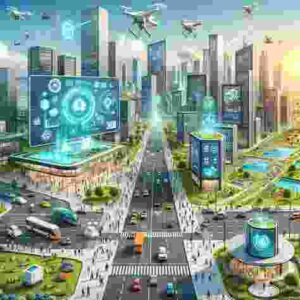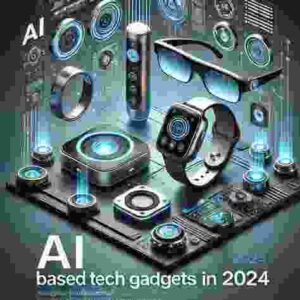In the United States, AI has rapidly evolved, driven by a combination of technological breakthroughs, vast amounts of data, and unprecedented investment in research and development. From autonomous vehicles to healthcare innovations, AI is reshaping industries and revolutionizing the way we live, work, and interact with technology.
At the heart of this transformation are AI startups—small, agile companies that are pushing the boundaries of what’s possible. These startups play a pivotal role in the future of AI, creating technologies that promise to solve some of society’s most pressing challenges, from healthcare advancements to financial efficiency.
This article explores 44 innovative AI startups in the United States that are paving the way for the future of AI. From pioneering new AI applications to addressing complex global problems, these companies are transforming industries and making a lasting impact on society.
Why US AI Startups Are Leading the Charge
The United States has long been a hub for technological innovation, and AI is no exception. A combination of factors has positioned the US as a global leader in AI development:
- Venture Capital Investment: The US is home to some of the world’s largest venture capital firms, which fuel innovation by providing funding to promising AI startups. In 2023 alone, US AI companies received over $12 billion in venture funding, underscoring the significant economic potential of AI.
- World-Class Talent: With top-tier universities like Stanford, MIT, and Carnegie Mellon producing some of the brightest minds in AI, the US has a deep talent pool that continues to drive the development of cutting-edge technologies.
- Research and Development: The US government and private sectors invest heavily in AI research, ensuring a constant flow of new ideas and advancements. The National AI Initiative Act of 2020 highlights the US government’s commitment to maintaining its leadership in AI innovation.
As a result, the country is home to some of the most disruptive AI startups in the world, many of which are transforming industries from healthcare to finance, and even creating new possibilities in everyday life.
Top 44 AI Startups Shaping the Future
The following 44 AI startups exemplify the diverse ways in which artificial intelligence is being applied across different sectors. These companies are tackling a wide range of problems, from improving healthcare outcomes to creating more efficient supply chains.
1. Healthcare AI
AI’s potential to revolutionize healthcare is already being realized through startups focusing on medical diagnostics, personalized treatment, and drug discovery.
- Tempus: Specializes in using AI to analyze clinical and molecular data to personalize cancer treatments.
- PathAI: Focuses on improving diagnostic accuracy with machine learning models designed to assist pathologists in detecting diseases like cancer.
- Butterfly Network: Aims to revolutionize medical imaging by using AI-powered portable ultrasound devices that provide real-time diagnostics.
2. Finance and Insurance AI
AI has the potential to disrupt financial services by streamlining operations, enhancing security, and improving customer experiences.
- Upstart: Uses AI to provide more accurate credit scoring and lending decisions, particularly for individuals with little or no credit history.
- Zest AI: Specializes in machine learning algorithms that help financial institutions assess credit risk more accurately and fairly.
- Lemonade: An insurance startup that uses AI to provide faster claims processing and personalized insurance products.
3. Autonomous Vehicles and Transportation
AI-driven technologies are helping create safer and more efficient transportation systems, including autonomous vehicles and smart mobility solutions.
- Aurora Innovation: Focuses on developing self-driving trucks and cars, using AI to improve safety and reduce transportation costs.
- Waymo: A subsidiary of Alphabet, Waymo is a leader in autonomous vehicle technology, using AI to power fully self-driving cars.
- Cruise: Acquired by General Motors, Cruise develops autonomous vehicle technology with the goal of creating a driverless future.
4. Retail and E-Commerce AI
AI is transforming how businesses interact with customers and optimize supply chains, leading to more personalized shopping experiences and efficient retail operations.
- Stitch Fix: Uses AI and data analytics to offer personalized clothing recommendations, transforming the retail experience.
- Standard Cognition: Specializes in AI-powered checkout-free retail technology, allowing customers to shop without interacting with a cashier.
- Slyce: Develops AI-driven visual search technology to enhance the online shopping experience by allowing users to find products using images.
5. AI in Manufacturing and Supply Chain
In the manufacturing sector, AI is driving automation, improving efficiency, and predicting maintenance needs, leading to cost savings and more sustainable operations.
- Veo Robotics: Uses AI to enhance industrial robots, allowing them to work safely alongside human workers in factories.
- Locus Robotics: Develops AI-driven robots for warehouses and fulfillment centers, improving the speed and efficiency of order picking and sorting.
- ClearMetal: An AI-powered inventory management platform that helps businesses optimize their supply chain by providing accurate demand forecasting.
6. AI in Cybersecurity
As cyber threats continue to evolve, AI is playing an increasingly important role in detecting and responding to attacks in real time.
- Darktrace: Uses machine learning to detect and respond to cybersecurity threats in real time by analyzing network traffic and identifying anomalies.
- Vectra AI: Specializes in AI-driven cybersecurity solutions that help organizations detect and respond to threats across cloud, data center, and enterprise environments.
The Role of AI in Healthcare
The healthcare industry is one of the most promising sectors for AI innovation. With its ability to analyze large datasets and uncover hidden patterns, AI has the potential to transform diagnostics, treatment, and patient care.
Startups like Tempus, which is using AI to analyze genomic and clinical data to personalize cancer treatments, are already making a huge impact. PathAI, another key player in the field, uses machine learning to assist pathologists in diagnosing diseases like cancer more accurately and quickly. These innovations are not only improving the accuracy of diagnoses but are also paving the way for more personalized, efficient treatments.
Ethical Considerations and Challenges
While the potential benefits of AI are enormous, there are also ethical considerations that must be addressed. Issues like bias in AI algorithms, privacy concerns, and the potential for job displacement are critical topics that AI startups must navigate.
Many startups are already working to address these issues, focusing on creating more transparent, accountable AI systems. For instance, companies like Zest AI aim to eliminate biases in lending algorithms by using more inclusive data to make credit decisions.
Advantages of AI
-
Increased Efficiency and Productivity
- Automation of Repetitive Tasks: AI can handle repetitive tasks quickly and accurately, freeing up human workers to focus on more complex and creative activities. For instance, AI can automate data entry, scheduling, and routine customer service tasks.
- 24/7 Operation: AI systems do not require breaks or rest, which makes them highly productive. Machines can work continuously without fatigue, leading to increased output and faster turnaround times in industries like manufacturing, logistics, and customer support.
-
Improved Accuracy and Precision
- Reduced Human Error: AI can significantly reduce the risk of human error, especially in fields where precision is critical, such as in healthcare (e.g., AI-powered diagnostic tools) and aviation (e.g., autopilot systems).
- Enhanced Data Analysis: AI algorithms can process vast amounts of data far more efficiently than humans, uncovering patterns and insights that may not be immediately apparent, which can lead to more accurate predictions and decisions.
-
Cost Savings
- Operational Efficiency: AI can help businesses optimize operations, reduce waste, and increase cost savings. For example, AI-powered predictive maintenance can reduce the need for costly repairs and equipment downtime by forecasting when a machine will need maintenance.
- Reduced Labor Costs: By automating tasks, businesses can lower the need for human labor in certain areas, resulting in direct cost savings.
-
Personalization and Customer Experience
- Tailored Recommendations: AI-driven systems, such as those used by online retailers (e.g., Amazon, Netflix), can analyze user preferences and recommend products or content tailored to individual needs and tastes.
- Enhanced Customer Support: AI-powered chatbots and virtual assistants can provide 24/7 customer service, addressing customer inquiries, resolving issues, and providing personalized solutions.
-
Improved Healthcare
- Medical Diagnosis: AI tools, such as machine learning models, can analyze medical images and patient data to help doctors diagnose diseases more accurately and at an earlier stage, leading to better outcomes.
- Drug Discovery: AI is also helping accelerate drug development by simulating and predicting how different compounds will interact in the body, thus reducing the time and cost of developing new medications.
-
Innovation and Advancements
- New Technologies: AI drives innovation in fields like autonomous vehicles, robotics, natural language processing (NLP), and smart devices. For example, self-driving cars use AI to analyze traffic patterns, road conditions, and potential obstacles in real time to make driving decisions.
Disadvantages of AI
-
Job Displacement and Unemployment
- Automation of Jobs: One of the biggest concerns surrounding AI is its potential to replace human workers in many industries, especially in sectors that rely on routine, manual tasks. This could lead to significant job displacement, particularly in areas like manufacturing, retail, and transportation.
- Skills Gap: While AI creates new job opportunities in fields like data science and AI development, it also demands a highly specialized skill set that many workers may not possess. This can result in a widening skills gap and increased inequality in the job market.
-
Bias and Ethical Concerns
- If the data used to train AI models is biased or incomplete, the AI system can perpetuate or even amplify these biases, leading to unfair outcomes. This is a significant concern in areas such as criminal justice, hiring practices, and healthcare.
- This can make it difficult to understand how AI systems arrive at certain decisions, raising concerns about accountability, particularly in critical applications like healthcare and law enforcement.
-
Security Risks and Cybersecurity
- AI-Driven Cyber Attacks: As AI becomes more advanced, it could be used to carry out cyberattacks, such as automated hacking, phishing, or malware generation. This increases the potential for malicious actors to exploit vulnerabilities in AI systems.
- This raises concerns about data privacy, as AI systems may collect and process sensitive information without adequate consent or safeguards.
-
Dependence and Loss of Human Autonomy
- Over-reliance on Technology: As AI becomes more integrated into daily life, there is a risk of humans becoming overly reliant on machines. Over-dependence could reduce critical thinking, creativity, and problem-solving skills, as people may defer to AI systems instead of making decisions themselves.
- Loss of Human Touch: AI’s reliance on algorithms and data can sometimes lack the empathy, intuition, and personal understanding that humans bring to decision-making, especially in fields like healthcare, counseling, and customer service.
-
High Costs of Development and Implementation
- Initial Investment: Developing advanced AI systems requires significant investment in research, technology, and talent. Small businesses or startups may find it difficult to afford the resources necessary to implement AI solutions.
- Ongoing Maintenance: AI systems need continuous monitoring, maintenance, and updates to remain effective and secure. This can incur high costs over time, especially as the technology becomes more complex.
- Potential for Job Polarization
- Creation of High-Skill, Low-Skill Jobs: While AI may create jobs in specialized fields like machine learning engineering, it may also lead to a reduction in mid-skill jobs, such as those in manual labor and administrative work. This could exacerbate inequality by creating a job market that favors workers with high technical skills or those with lower-paying, service-based roles.










